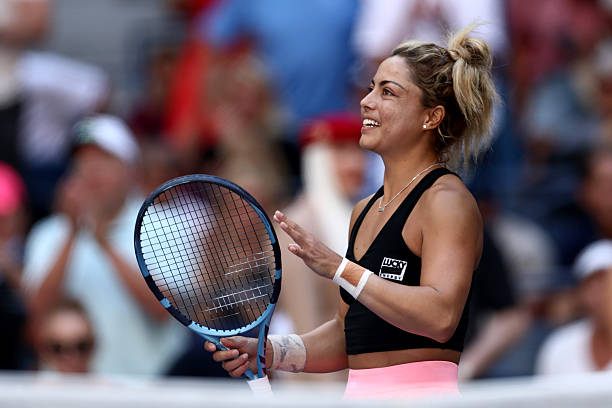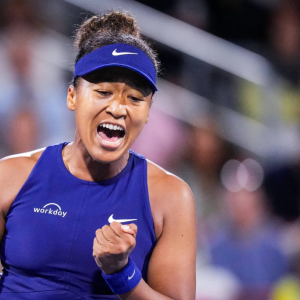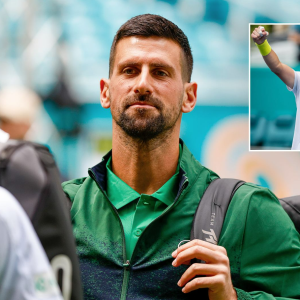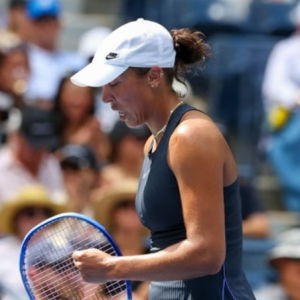NEW YORK—Shadows swallowed up Arthur Ashe Stadium court completely as Renata Zarazua seized inspirational light.
Down a set and love-3, Zarazua stormed back shocking an error-plagued Madison Keys 6-7(10), 7-6(3), 7-5 in a gritty three hour, 10-minute US Open first-round upset.
Standing just 5-foot-3, in her white and hot pink shoes, Zarazua was tough at crunch time and played far more consistent combinations than Keys who repeatedly flat-lined her favored forehand into net in hitting herself right out of the Open.

It was Keys’ first opening-round Grand Slam loss since she fell to good friend Sloane Stephens in the 2021 US Open first-round that was a rematch of their 2017 final.
Near tears from the pressure of facing a Grand Slam champion on the game’s biggest stage, Zarazua was all smiles when Keys’ final forehand expired into net to end an astonishing upset.
“I’m just very happy,” said Zarazua after posting her seventh win of the season. “Obviously, coming into the match I was almost crying because I was very nervous.
“I think the crowd made it very chill for me. I know my game is tricky, so sometimes people get bored. So thank you for staying and cheering to the end.”
Australian Open champion Keys, playing with taping around her left thigh, looked tight, could not create consistent net clearance and unraveled in miscues over the final two games.
The sixth-seeded Keys committed self-sabotage on Ashe Stadium, which she’s called her favorite court. Keys committed a horrific 89 unforced errors—55 more than her 82nd-ranked opponent.
The Keys forehand, one of the most formidable shots in the sport when it’s firing with accuracy, deserted her in the end and the American coughed up 14 double faults on the day.
“I feel like today I was just, for the first time in a while, where my nerves really got the better of
me, and it kind of became a little bit paralyzing,” Keys said. “I felt like I was just slow, I wasn’t seeing things the way that I wanted to, which I feel like resulted in a lot of bad decisions and
lazy footwork. So I feel like that’s kind of the summary.”
It is Zarazua’s first career Top 10 victory—and a historic win for Mexico.
Zarazua is the first Mexican to beat a Top 10 seed in a Grand Slam since cult hero Angelica Gavaldon, another small but spirited baseliner, took down Hall of Famer Jana Novotna at the 1995 Australian Open. New York fans of a certain age will recall Gavaldon, known for her stinging topspin and habit of wearing hoop earrings, attracted a major fan following at the US Open during her playing days.
The only Mexican woman in the singles draws said fans inspired her today.
“I think it’s a country that we don’t have many tennis players as you can see,” Zarazua said. “But I had some of the Mexican players from doubles as you can see. Definitely I could hear some Mexicans cheering so that was very nice.”
Both women were wearing strapping around their left legs with Keys sporting thick adhesive taping wrapping her left thigh.
Keys said Zarazua’s skill extending points was a key to the match.
“She made a ton of balls, and she reset the point a lot. I mean, kudos to her for making
me play a lot of balls today,” Keys said. “I mean, she’s a tricky player. I mean, I felt like she was kind of resetting the point over and over and over again and just kind of stayed tough in really important points.”
Though Zarazua was often hitting first serves slower than 90 mph, Keys could not crack the code on return.
Sometimes softer serving on the quick hard courts can confound big hitters in pressure-packed matches as they don’t move up to the ball as quickly as they should. We saw it happen on Grandstand yesterday as Alexandra Eala, also serving around 90 mph or slower, upset big-hitting 14th-seeded Clara Tauson, 6-3, 2-6, 7-6(11).
Zarazua actually defended her second-serve better—she won 56 percent of second serves compared to 41 percent for Keys—and broke the American six times.
“Just take one and go in,” Keys’ coach and husband Bjorn Fratangelo urged her on return midway through the third set.
Keys did exactly that on the next point drawing an error to get to deuce in the fifth game, but then she buried successive returns in the net as Zarazua edged ahead 3-2 after two hours, 38 minutes.
Wearing taping on her left leg, Zarazua dabbed a sharp-angled backhand drop shot holding at 30 for 4-3.
Shoulders slumped Keys double faulted deep at 3-4 to face break point then bashed a backhand long to fall into a 3-5 hole after two hours, 51 minutes.
“Come on Maddie! You got this,” Keys’ box implored her trying to spark some life into a comeback. Keys probably would have been better off employing the Lindsay Davenport tactic of driving deep returns right down the middle right back at the server, but she opted instead to try to find the lines.
Squatting low, Aga Radwanska-style, Zarazua flicked a forehand that crawled over net setting up a forehand down the line to open the ninth game. Keys cracked a forehand return winner to level. Keys smacked a forehand strike down the opposite sideline for 15-30, but the erratic play continued as she sailed a backhand return for 30-all. Zarazua was two points from a career win.
Dropping down to her knees again, Zarazua tried fighting off a running forehand but missed the baseline to face a break point. Tightening behind a 77 mph first serve, Zarazua tried amping up the pace on her forehand but sent it long as Keys broke back for 4-5.
When Keys flattened a forehand into net to fall to 30-all she was again two points from defeat. The Australian Open champion spun a winner down the line for game point. Keys hung tough through a tense deuce hold leveling at 5-all after three hours of nervy play.
In the 11th game, Keys’ unforced error total climbed to a dizzying 85 as she missed three returns in a row off of pretty pedestrian serves. Zarazua held to go up 6-5.
Slapping two forehands into net, Keys went down 15-30—for the third time she was two points from elimination.
A defensive Zarazua improvised a slice forehand deep in the court and Keys flat-lined another forehand into net to face match point at 30-40.
Keys final forehand died in net and a joyous Zarazua raised her arms in triumph and covered her face with her hands.
The 27-year-old Zarazua improved to 5-8 lifetime in Grand Slam play as she moves into a second-round meeting against Frenchwoman Diane Parry, who swept two-time Wimbledon winner Petra Kvitova in the Czech’s final major match on Grandstand.
Relishing her moment on the big stage, Zarazua made a major stand
“I’m a little bit small in height so coming in here I was like Oh my gosh this is huge,” Zarazua said “Sometimes I was all the way back here. The court is so big I just tried to enjoy it because I know when I retire I’m gonna be happy about it so I was like just enjoy it.
“My relationship with tennis is a lot. If I’m not playing tennis I’m trying to find a way to play tennis. I think deep inside I just really like it it’s a very nice sport.”





